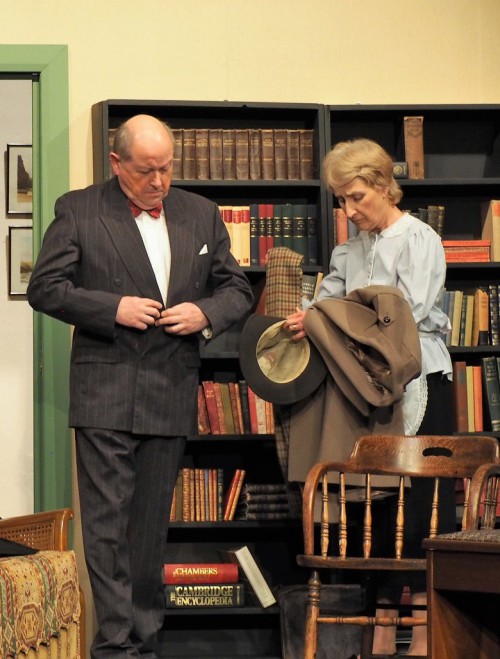"Accolade" 25 to 28 April 2018
By Emlyn Williams, directed Beth Duce
Accolade completed its run on the 28th of April having played to a total audience of more than 430. Unsettling in its subject matter, this wonderfully written piece by Emlyn Williams was nevertheless topical, relevant and ultimately extremely gripping as well as thought-provoking. Our sincere thanks go to Beth Duce who as director was unstinting in her commitment to the production and who as always provided a reassuring but at all times inspiring hand on the tiller. And as always, many thanks once again to our loyal audience members for their much appreciated support.
Reviews, audience reactions and production photos follow below.
Production photos from "Accolade"
Programme for "Accolade"
For further details of this production, including the full cast and crew, please click on the PDF document below:
Reviews of "Accolade"
Our thanks go to Julie Bozza and Ann Lightman for these reviews of our production of Accolade. Ann's review will be published shortly in "Adel Bells".
A young friend of mine, Harry Peart, is making his stage debut in this play produced by am-dram group Adel Players, so I did hie me to the Yorkshire moors to catch this evening’s performance. Adel Players are named for Adel, the town in which they are based near Leeds, and they produce plays in the hall belonging to the local War Memorial Association. The company was founded in 1945. For the past few years, Harry’s mother, Shell Peart, has been part of the team, helping put on three shows a year. Shell has acted in various roles, and also helps behind the scenes, especially in set design, props, and publicity.
Accolade was a new play for me, so I was thrilled to watch it unfold through all its twists and turns. It was written by Welsh playwright Emlyn Williams, and first performed in 1950. Accolade tells the story of the Trenting family. The father, Will Trenting (David Lancaster), is about to be knighted, but that of course shines a spotlight on his double life, and a scandal emerges that surprises everyone. I thought David Lancaster did a splendid job as Trenting, as did Dianne Newby as his wife Rona, and Harry Peart as their son Ian. The whole cast were terrific, but these three – as the family at the heart of it all, with the most to lose – gave particularly genuine and moving performances.
The story was interesting to me as a writer, because Trenting is a published writer – and one of the other characters we meet is desperate to be one, too. The other half of Trenting’s double life has provided him with a great deal of material for his books, and yet it is clear that the life and the choices he has made reflect on himself as a person rather than as a writer. I liked his honesty and sense of responsibility, as well as his love for his family.
Rona was also sympathetic. She has a very clear-eyed view of her husband, and has loved him unconditionally, with no regrets. As a result, they have built a life and a home and a family together – but when it’s all about to come tumbling down around your ears, it’s inevitable that you start to question your own choices. Meanwhile, Ian is young and innocent, and all the adult characters care for him enough to protect him from what they can. But his perspective can also cut through to the heart of the matter, if they let it.
I can’t say any more about the story or characterisations without revealing too much. It’s an interesting play to watch, and I think the Adel Players and director Beth Duce have done a superb job in bringing it to full life. Unfortunately there’s only one more show in this short run, and it’s been sold out for a while. But if you’re anywhere near Leeds, you might like to keep an eye on the company. I believe their next show is a murder mystery called A Murder of Crows – and our Harry will once again be treading the boards!
Julie Bozza
~~~~~~~~~~~~~~~~~~~~~~~~~~~~~~~~
The play chosen was Accolade by Emlyn Williams which first appeared in 1950 when it “pushed the boundaries of acceptable theatre at the time” –to quote from the publicity. I found it a troubling play – posing moral dilemmas which the play does not attempt to answer. The publicity stated that the theme is very relevant to today which is undoubtedly true, but whether that meant the play worked well for today’s audiences is another matter. Audiences in 1950 had not lived through the “liberated” 60’s with the “realistic” plays – most of which seem to have been written after this play and today’s trials by media. It must have been ground-breaking in its day.
The Adel Players production to full houses over four days was, as usual, superb – the stage set, costumes and music putting us straight back into the stylish home of a well-off 1950 family where the news of the head of the household becoming a knight for his services to literature (he was a writer of realism) had just been received in the New Year’s Honours list. It soon became apparent he had been leading a bit of a double life, taking off for “dirty weekends” from time to time in the full knowledge of his wife. This had seemed harmless enough until the father of an under-age girl, who had been a victim at the last one, appeared at his home and attempted to bribe a position in the household. The writer at this point seemed to show remorse ...partly as he had a son of the same age perhaps, and our heads were soon reeling with questions – could/should the wife had done more to try to stop these weekends? Why do creative people often need to flout convention? Would they be as gifted without a deviant streak? Was the publisher (and by extension the public) a hypocrite for enjoying the end result but horrified when found it was based on fact? More controversially - don’t most of us have a secret or two we would prefer kept hidden?
The second half did not provide answers. The writer and those closely involved with him, including a couple from Rotherhithe friends from his “hidden” life, decided to confront the father. This led, perhaps inevitably, to his going to the police and prosecution followed. Of course the trial attracted press attention, resulting in the couple being dropped by many who knew them – including all but one of their servants. While they study a brochure for a remote cottage on Guernsey to escape to and contemplate a possible spell at H.M.’s pleasure, a crowd gathers outside their house and a brick is thrown. Society has made up its mind – it is
easier to judge those we do not know than those we do. The whole scenario must have appeared quite shocking back in 1950.
The play kept my attention throughout – not least because of the superb professionalism of the quite large cast (10) – with a young Harry Peart making his debut…and maybe Anne Andrews, who is more often on the front desk. There were also some comedic touches with the class system coming into play – Rotherhithe v. West End. But the play didn’t emotionally connect with me – maybe an over-reliance on words – all the action took place in the writer’s lounge. Maybe there were too many characters for them to be more than silhouettes (how did the Rotherhithe couple care for their daughter that they said they doted on?). Maybe my brain just can’t cope with too many dilemmas! A (much younger) person enjoyed the play and summed up beautifully the main message “all actions have consequences” – a point emphasised by the staging – from the lounge one could see through to the staircase and the garden – all actions in the private or public domain interact with the other.
Ann Lightman
Here's where you can enter in text. Feel free to edit, move, delete or add a different page element.






